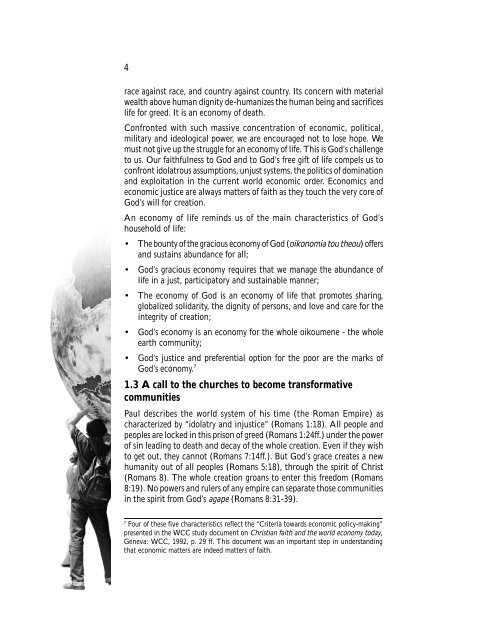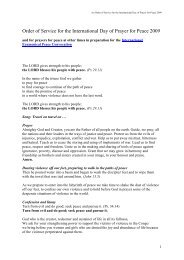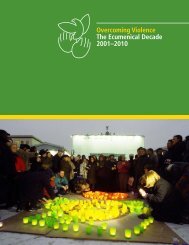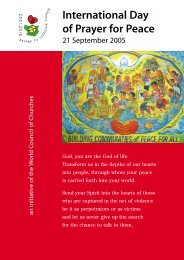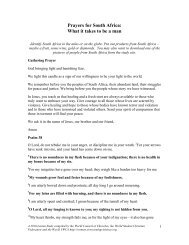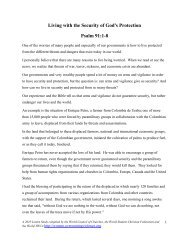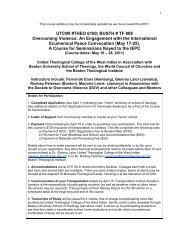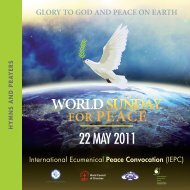Alternative Globalization Addressing Peoples and Earth
Alternative Globalization Addressing Peoples and Earth
Alternative Globalization Addressing Peoples and Earth
You also want an ePaper? Increase the reach of your titles
YUMPU automatically turns print PDFs into web optimized ePapers that Google loves.
4<br />
race against race, <strong>and</strong> country against country. Its concern with material<br />
wealth above human dignity de-humanizes the human being <strong>and</strong> sacrifices<br />
life for greed. It is an economy of death.<br />
Confronted with such massive concentration of economic, political,<br />
military <strong>and</strong> ideological power, we are encouraged not to lose hope. We<br />
must not give up the struggle for an economy of life. This is God’s challenge<br />
to us. Our faithfulness to God <strong>and</strong> to God’s free gift of life compels us to<br />
confront idolatrous assumptions, unjust systems, the politics of domination<br />
<strong>and</strong> exploitation in the current world economic order. Economics <strong>and</strong><br />
economic justice are always matters of faith as they touch the very core of<br />
God’s will for creation.<br />
An economy of life reminds us of the main characteristics of God’s<br />
household of life:<br />
• The bounty of the gracious economy of God (oikonomia tou theou) offers<br />
<strong>and</strong> sustains abundance for all;<br />
• God’s gracious economy requires that we manage the abundance of<br />
life in a just, participatory <strong>and</strong> sustainable manner;<br />
• The economy of God is an economy of life that promotes sharing,<br />
globalized solidarity, the dignity of persons, <strong>and</strong> love <strong>and</strong> care for the<br />
integrity of creation;<br />
• God’s economy is an economy for the whole oikoumene - the whole<br />
earth community;<br />
• God’s justice <strong>and</strong> preferential option for the poor are the marks of<br />
God’s economy. 7<br />
1.3 A call to the churches to become transformative<br />
communities<br />
Paul describes the world system of his time (the Roman Empire) as<br />
characterized by “idolatry <strong>and</strong> injustice” (Romans 1:18). All people <strong>and</strong><br />
peoples are locked in this prison of greed (Romans 1:24ff.) under the power<br />
of sin leading to death <strong>and</strong> decay of the whole creation. Even if they wish<br />
to get out, they cannot (Romans 7:14ff.). But God’s grace creates a new<br />
humanity out of all peoples (Romans 5:18), through the spirit of Christ<br />
(Romans 8). The whole creation groans to enter this freedom (Romans<br />
8:19). No powers <strong>and</strong> rulers of any empire can separate those communities<br />
in the spirit from God’s agape (Romans 8:31-39).<br />
7<br />
Four of these five characteristics reflect the “Criteria towards economic policy-making”<br />
presented in the WCC study document on Christian faith <strong>and</strong> the world economy today,<br />
Geneva: WCC, 1992, p. 29 ff. This document was an important step in underst<strong>and</strong>ing<br />
that economic matters are indeed matters of faith.


